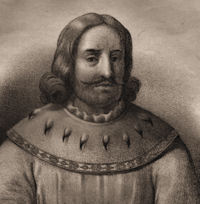Lent: March 2nd
Tuesday of the First Week of Lent
Other Commemorations: Bl. Charles the Good, Martyr (RM)
» Enjoy our Liturgical Seasons series of e-books!
"Yes, if you forgive others their failings, your heavenly Father will forgive you yours; but if you do not forgive others, your Father will not forgive your failings either." (Matt. 6:14-15) There is an eternal serenity, an imperturbable justice, an unwavering tenderness about God's exalted ways. They are not our ways, because they are above the turbulence of passion, the traffic of ambition, the clash of personalities. (Daily Missal of the Mystical Body)
At Rome, the Station is in the church of St. Anastasia, where, formerly, the Mass of the Aurora on Christmas Day was celebrated. It is under the protection of this holy martyr, who suffered death for Christ on the day of His birth, that we offer our prayers today to the Father of mercy.
Meditation on the Our Father
In verses 14 and 15 St Matthew gives us a sort of commentary of our Lord on the fifth petition of the Our Father.
A God who forgives is a wonderful God. But if God, who is thrice-holy, has mercy on the sinner, how much more ought we forgive others — we sinners, who know from our own experience the wretchedness of sin. No one on earth is perfect. Just as God loves us, even though we have defects, and forgives us, we should love others, even though they have defects, and forgive them. If we wait to love people who have no defects, we shall never love anyone. If we wait until others mend their ways or apologize, we will scarcely ever forgive them. But then we ourselves will never be forgiven. "All right: that person has behaved badly towards you. But, haven't you behaved worse towards God?" (J. Escriva, The Way, 686).
Thus, forgiving those who have offended us makes us like our Father, God: "In loving our enemies there shines forth in us some likeness to God our Father, who, by the death of his Son, ransomed from everlasting perdition and reconciled to himself the human race, which before was most unfriendly and hostile to him" (Catechism of the Council of Trent, IV, 14, 19). — The Navarre Bible - St. Matthew
Things to Do:
- Today's Gospel gives the account of Jesus teaching His disciples to pray the Our Father. Meditate on this prayer, particularly the line, "thy will be done" (fiat voluntas tua) with your children, using Jesus' agony in the Garden of Gethsemane as an example of how He lived this prayer ("Father, not my will, but Thine, be done"). Read Scott Hahn's book, Understanding "Our Father": Biblical Reflections on the Lord's Prayer, in which he compiles his own Scriptural exegesis as well as material from four Church Fathers on the Our Father.
Blessed Charles the Good
Count Charles of Flanders, was called "the good" by the people of his kingdom. They named him for what they found him to truly be. He was the son of St. Canute, king of Denmark. Charles was just five years old when his father was murdered in 1086. When Charles grew up, he married a good young woman named Margaret. Charles was a mild and fair ruler. The people trusted him and his laws. He tried to be an example of what he expected the people to be.
Some nobles accused Charles of unjustly favoring the poor over the rich. He answered kindly, "It is because I am so aware of the needs of the poor and the pride of the rich." The poor of his realm were fed daily at his castles.
Charles ordered the abundant planting of crops so that the people would have plenty to eat at reasonable prices. Some wealthy men tried to hoard grain to sell at very high prices. Charles the Good found out and forced them to sell immediately and at fair prices. An influential father and his sons had been reprimanded by Charles for their violent tactics. They joined the little group of enemies who now wanted to kill him.
The count walked every morning barefoot to Mass and arrived early at the Church of St. Donatian. He did this in a spirit of penance. He longed to deepen his own spiritual life with God. His enemies knew that he walked to church and also that he prayed often alone before Mass. Many people who loved Charles feared for his life. They warned him that his walks to St. Donatian could lead to his death. He replied, "We are always in the middle of dangers, but we belong to God." One morning, as he prayed alone before the statue of Mary, his attackers killed him. Charles was martyred in 1127.
>—Excerpted from Holy Spirit Interactive
Patronage: counts; Crusaders; diocese of Burges, Belgium
Symbols and Representation: nobleman with a purse and a sword; depicted after his martyrdom in the cathedral; sword
Highlights and Things to Do:
- Read more about Bl. Charles:
- His remains are in the Sint-Salvatorskathedraal or Saint-Salvator Cathedral of Bruges, Flanders, in present-day Belgium.
 Saturday of the Second Week of Lent
Saturday of the Second Week of Lent
Station with Santi Marcellino e Pietro al Laterano (Saints Marcellinus and Peter):
The Station is in the church of Sts. Peter and Marcellinus, two celebrated martyrs of Rome under the persecution of Diocletian. Their relics were brought to the church in 1256, and the church was restored the same year on order from Pope Alexander IV. Santi Marcellino e Pietro al Laterano is a Roman catholic parish on the Via Merulana at the intersection with via Labicana. Their feast day is June 2..
For more on Santi Marcellino e Pietro al Laterano, see:
For further information on the Station Churches, see The Stational Church.






